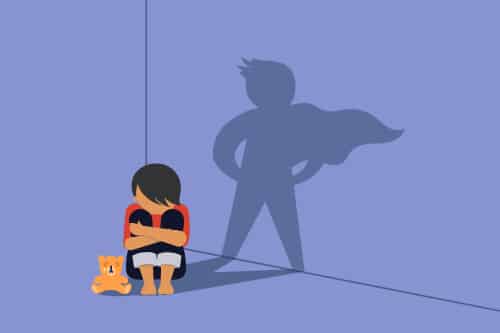Does confidence issues stem from your childhood?
Ishita Sharma
April 16, 2021
Ishita Sharma
April 16, 2021
Do you struggle with expressing yourself ? Do you find yourself staying quiet during meetings and conflicts? You might be struggling with confidence issues. This article explores how confidence issues start and its impact. This will be an eye-opener to help address issues pertaining to self-esteem.
Confidence is belief in one’s capabilities, viewpoints and worth. The right amount of confidence helps you carry yourself with heads held high, but with feet firmly in the ground. Individuals who are confident trust themselves to achieve great things. They approach any situation with boldness. They rely less on others to reassure them. These individuals look at their lives in terms of growth and enhancement.

Low confidence usually stems from low self esteem. While it is usually to have some of these signs from time to time, especially while encountering new life events, individuals who have low confidence have these more constantly.Here are some signs which indicate confidence issues.
1. Self-doubt: If you find yourself constantly doubting your ideas and opinions, you may be having issues with confidence. Not feeling sure about you choices and viewpoints, makes you keep to yourself more often.
2. Negative thoughts: Negative perception and devaluing oneself by engaging in overthinking, imagining the worst outcomes. Assuming negative comments from others.
3. Indecisiveness: Poor decision making skills and depending on others to help you make any decisions.
4. Fear of failure: In an attempt to be good enough, doing tasks which they believe they have competency in. Fear of making a mistake can show up through procrastination, avoiding challenging work, avoid taking initiative etc.
5. Comparison: Comparing yourself with others on different parameters like career growth, money, friends, knowledge etc.
6. Minimising strengths: These individuals downplay their achievements and strengths. It’s also hard for them to accept compliments and praises
Can you relate to these signs? Click here to speak to a psychologist

The root cause of confidence lies in genetics and environment you are raised in. If your parent struggled with confidence issues, there are some chances that you might too. Parents and/or caregivers’ ways of upbringing determines the way a child builds their idea of themselves. Overinvolved and neglectful parents both play a key role in child’s self-esteem. Harsh and strict parenting conditions a child to believe that they are not good enough. Whenever a child attempts to do something, if the response is critical and undermining, the child bases that they are not capable. If a child encounters a failure and it’s treated as unacceptable, the child is being conditioned to believe that failure and mistakes are unfavourable.
Environment plays a major role when it comes to concerns with confidence. A child growing up in a place where there is constant comparison, worth based solely on achievements starts to question their worth. Highly competitive environment might lead the child to focus more on challenges rather than feeling proud of where they are at right now.
Peers plays an important role in helping us determine an understanding of ourselves. Children form their perception of themselves not only through what their parents, caregiver and teachers tell them but also their friends and peers. If a child is rejected by others, made fun of, side-lined, the issues of confidence stems up. The child either tries hard to adapt with other peers or gives up during that process. They can also raise identity issues in a child especially during adolescence.
Traumatic events can lead to lower confidence levels. Traumatic events include encountering a loss, unwell caregiver, abuse, and harassment etc. These incidents impact a person’s self-esteem and lowers the confidence majorly.
Media and society’s standards can lead to issues with confidence. Unrealistic body image, career and life expectation can put a lot of pressure. These unrealistic standards cause individuals to devalue and undermine themselves.

Can you improve your confidence level as you keep growing? Yes definitely! Our brain is plastic, that means we can unlearn and relearn anything. You can train yourself to start focusing on your positive and work with the critical conditioned voice. Here are some ways you can start your journey to increase your confidence
Low Self-esteem is a classical example of strained childhood experience , it could be due to the corporal parenting style adopted and the constant comparison with peers in academia. This is inturn sits with the child during his growing and is explicit during the onset of puberty. It is important to address this as early as one recognises the signs of low self-esteem otherwise can be quite detrimental to the kind of personality they will adopt and have a deep impact on their relationships and choice of career.
Q. Do confidence issues impact one’s personal life?
Confidence issues impact a person’s overall sense of self as it makes them believe they may not be capable. In personal life, confidence issues prevent you from speaking your thoughts and ideas clearly, confront others, making independent decisions and question your self worth. These can cause anxiety and depression too.
Q. How do you own yourself with confidence when surrounded by critical people?
Surrounded by critical individuals, it can be hard to keep your confidence up all times. But it’s not impossible to do so. Setting boundaries, speaking up assertively when criticised are some ways to stand up for yourself and put limits on what you receive from others. Working with a therapist will help to maintain your progress in these areas.
Q. Is it possible to rebuild your inner world to increase your self esteem?
Yes, it is. We have the capability to change our narratives that are limiting us. By challenging those beliefs which do not serve any purpose, by supporting and nurturing yourself, you will be able to increase your self esteem.

Whatever you have discussed is exactly, what is happening. In my life. At 50years my life has been reined, stanganated and right now struggling with depression. However l thank you for this article because now l can understand were my low confidence stems from and determined to fight this illness and reboot my life wance again.